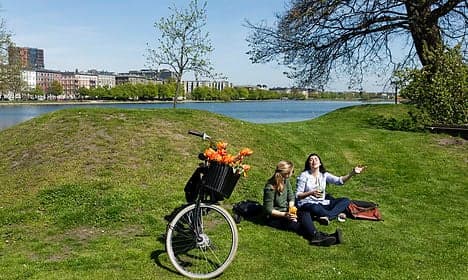Denmark gets earliest 'summer day' in years

The calendar may still show early May but temperature-wise, it is already summer in Denmark.
In Denmark, a ‘summer day’ is any day in which temperatures top 25C. With official readings of 25.1C in both the northern Jutland town of Vestervig and near the northern Zealand town of Gilleleje, Sunday was the first summer day of 2016.
If those temperatures seem high this early in the year, it is with good reason. According to TV2’s records, Sunday’s highs gave Denmark its earliest summer day in nine years. Not since 2007, when highs topped 25C on April 26th, has the Nordic nation enjoyed such an early start to warm weather.
By comparison, the first summer day measured in 2015 didn’t come until well over a month later on June 13th.
While the capital just barely missed the ‘summer’ designation cut-off, the 24.9C measured in Copenhagen on Sunday marked the highest temperature measured this early in the year since 2000.
What everyone wants to know, of course, is how long this unseasonably warm weather will last. Although the Danish Meteorological Institute (DMI) put the rather ominously sounding headline of ‘Enjoy the warmth will it lasts’ on its extended forecast issued on Monday morning, things look very promising throughout the week.
Daytime highs should reach up to 25C on Monday before tapering off slightly as the week progresses. By Friday, highs will be around 15-20C while Saturday will bring a turn for the worse, with highs between 9-14C with mostly cloudy skies and showers.
Looking ahead to the Whit Monday national holiday on May 16th, it appears the good times will be over for this round.
“It is quite certain that it will be significantly colder over Pentecost,” DMI wrote.
While 25C is enough to qualify for a ‘summer day’, Denmark technically uses the meteorological definition of seasons, meaning that summer refers to the months of June, July and August, as opposed to beginning on the summer solstice and ending on the autumnal equinox as in some other countries.
Comments
See Also
In Denmark, a ‘summer day’ is any day in which temperatures top 25C. With official readings of 25.1C in both the northern Jutland town of Vestervig and near the northern Zealand town of Gilleleje, Sunday was the first summer day of 2016.
If those temperatures seem high this early in the year, it is with good reason. According to TV2’s records, Sunday’s highs gave Denmark its earliest summer day in nine years. Not since 2007, when highs topped 25C on April 26th, has the Nordic nation enjoyed such an early start to warm weather.
By comparison, the first summer day measured in 2015 didn’t come until well over a month later on June 13th.
While the capital just barely missed the ‘summer’ designation cut-off, the 24.9C measured in Copenhagen on Sunday marked the highest temperature measured this early in the year since 2000.
What everyone wants to know, of course, is how long this unseasonably warm weather will last. Although the Danish Meteorological Institute (DMI) put the rather ominously sounding headline of ‘Enjoy the warmth will it lasts’ on its extended forecast issued on Monday morning, things look very promising throughout the week.
Daytime highs should reach up to 25C on Monday before tapering off slightly as the week progresses. By Friday, highs will be around 15-20C while Saturday will bring a turn for the worse, with highs between 9-14C with mostly cloudy skies and showers.
Looking ahead to the Whit Monday national holiday on May 16th, it appears the good times will be over for this round.
“It is quite certain that it will be significantly colder over Pentecost,” DMI wrote.
While 25C is enough to qualify for a ‘summer day’, Denmark technically uses the meteorological definition of seasons, meaning that summer refers to the months of June, July and August, as opposed to beginning on the summer solstice and ending on the autumnal equinox as in some other countries.

Join the conversation in our comments section below. Share your own views and experience and if you have a question or suggestion for our journalists then email us at [email protected].
Please keep comments civil, constructive and on topic – and make sure to read our terms of use before getting involved.
Please log in here to leave a comment.